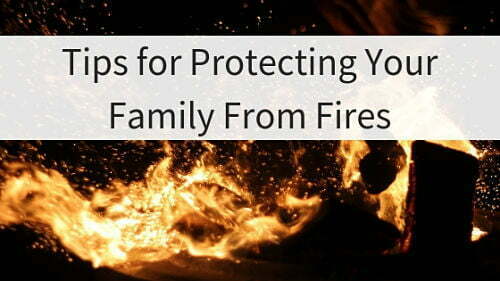
Fire prevention is a key part of the planning process. Educate family members of every age on how they can prevent dangerous situations. Fire Departments often host educational seminars open to the community. Contact your local station to see how you can become more informed.
Governor Jerry Brown declared wildfires the “new normal.” Unfortunately, Californians have been in a state of emergency due to these persistent, blazing conditions. Despite the origin of the fire from arson to electrical, families should be prepared. It’s critical to have a plan in advance.
The Red Cross maintains a list of home fire safety tips. They offer an emergency app that contains alerts and a monster guard app for children aged 7-11 to teach them what to do in real-life situations. The Red Cross recommends you do the following:
- Install smoke alarms on every level of your home, inside bedrooms and outside sleeping areas.
- Test smoke alarms every month. If they’re not working, change the batteries.
- Talk with all family members about a fire escape plan and practice the plan twice a year.
- If a fire occurs in your home, GET OUT, STAY OUT and CALL FOR HELP. Never go back inside for anything or anyone.
Escape a house that is on fire as quickly as you can by following the family escape plan. Get low and go when the smoke and poisonous hot air is rising. Once you arrive to your designated safe family meeting place outside of the home, call 9-1-1 immediately.
- Create a home fire escape plan to help adults and children to know exactly what to do and where to go should a fire break out in the home.
- Practice evacuating your home within two minutes to safety. Go through your emergency plan every 4 to 6 months to keep the emergency process fresh in everyone’s mind.
- Reduce children’s anxiety about the idea of an emergency happening in their home by offering a favorite treat or special reward when children follow directions and complete the evacuation.
- Learn how to operate a fire extinguisher with all your family members.
- Participate in Fire Prevention Week in October that was established to commemorate the 1871 Great Chicago Fire.
According to Cal Fire, it’s important to teach children to practice the following steps should their clothing catch on fire:
- STOP! Do not run.
- DROP to the ground.
- ROLL and cover your face with your hands. Keep your legs straight and roll over and over and back and forth to put the fire out.
The city of Villa Park maintains a web page dedicated to public safety. According to the site, “The Orange County Fire Authority is a regional fire service agency that serves 23 cities in Orange County, including Villa Park, and all unincorporated areas. The OCFA protects over 1,680,000 residents from its 71 fire stations located throughout Orange County. OCFA Reserve Firefighters work 10 stations throughout Orange County.” Visit the OCFA Fire Safety page for cooking, smoking, fireplace, and electrical safety.
The U.S. Fire Administration’s tagline is, “working for a fire-safe America.” Their mission is to “provide national leadership to foster a solid foundation for our fire and emergency services stakeholders in prevention, preparedness, and response.” Their website lists free materials on ways to avoid home fires, collaborate with media groups to publicize educational messages, and perform research for fire detection. Part of civilian responsibilities’ is to ensure that their home has been recently inspected with an active fire sprinkler, smoke alarm, and other fire detection technologies. This due diligence could save your life.
As modern homes are constructed, these materials react differently to open flames. Firefighters maintain an active continued education to prepare for an array of scenarios. In the city of Villa Park, fire and building codes are “developed through a national code development process.” Historic homes should have routine inspections to ensure the safety of electrical systems that could create fires. Don’t assume that the prior homeowner took due diligence in maintaining its conditions. Modern building materials have been studied in the lab and constructed according to stricter guidelines.
Ready.gov recommends you sleep with your bedroom door closed. If your home is on fire, make sure to feel the heat levels on the doorknob and door before you open it. “If either is hot, or if there is smoke coming around the door, leave the door closed and use your second way out.” You should also keep a phone near your bed in case you need to call 9-1-1 to report a fire.
If given an opportunity to evacuate prior to being impacted by a regional fire, you should be prepared.
- Know where to meet your family in a safe location.
- Use a safety app and/or social media to let family and friends know you are out of harm’s way when you arrive at your safe spot.
- Keep your valuables together. Having a fire proof safe can help you save items in case you can’t obtain them in time.
- Consult check sheets to see if you’ve considered all critical materials like medical records, legal documents, and personal photos. It’s recommended that you make digital copies of them.
In a crisis, you often don’t have time to locate and consider which valuable items you can take with you. It’s better to prepare now when you aren’t frantic and trying to survive a dangerous situation.
Our society’s health and safety depends on a fire station’s ability to respond quickly. Make sure the 9-1-1 dispatcher understands your location clearly and explain the situation thoroughly. Ensure that they arrive in a safe environment by maintaining an organized home that has a clear pathway with no fire hazards. Your escape route should be memorized so in a fight-or-flight scenario, you know exactly what to do.
More Reading